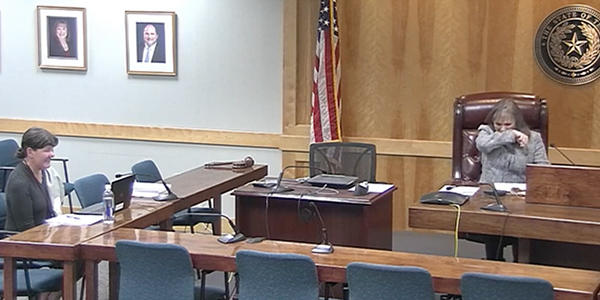Meeting in a hearing room absent of staff and regulatory lawyers, the Texas Public Utility Commission last week approved several measures addressing delinquent customer accounts and other issues related to the COVID-19 coronavirus pandemic.
The commissioners on Thursday voted unanimously to issue an order that will temporarily suspend a series of rules allowing retail electric providers (REPs) and other utility participants to disconnect service for nonpayment. Instead, all REPS must suspend late fees and offer a deferred payment plan upon customer request (50664).
The PUC also created the COVID-19 Electricity Relief Program, a funding mechanism through which REPs may recover a “reasonable portion of the cost of providing those uninterrupted services to customers facing financial hardship.” The program will last for six months, unless the PUC extends it (50703).
The commission said the initial funding mechanism is temporary and requires further review. Transmission and distribution utilities will collect funds from customers in ERCOT’s customer-choice areas through a rider — based on 33 cents/MWh — which will reimburse the utilities for unpaid bills.
The commissioners plan to revisit the order in a month.
“We’re going to do whatever we need to do to address this situation with electricity and the customers,” Chair DeAnn Walker said during the open meeting. “I’m concerned [the rider] may be too low. If we had a moratorium on disconnects for the next three months, the market couldn’t stand it. We need a reasonable balance to the needs of people losing their jobs with the needs of the market.”
Commissioner Arthur D’Andrea agreed.
“We can’t have disconnects while people have been ordered not to work by the government,” he said. “I think it’s the government’s responsibility to make sure they at least have lights and water while they’re sitting at home under government order.”
TXU Energy and Reliant Energy have already pledged to stop disconnections and late fees.
The order also covers Entergy, El Paso Electric (EPE), Southwestern Public Service and Southwestern Electric Power Co., which operate outside of the ERCOT market under PUC-set rates. The companies may not charge late fees or disconnect customers for nonpayment during the emergency, the commission said.
The commissioners and an IT technician were the only four people in the meeting room. They practiced social distancing, with Walker once coughing correctly into her elbow.
“It’s a new day for all of us,” Walker said.
AEP Texas Gets CCN in South Texas
The PUC also approved a certificate of convenience and necessity for AEP Texas to construct a $78 million, 138-kV transmission line in South Texas. The line could be 50 to 85 miles long (49347).
The commissioners overcame their reluctance to approve the project, noting that ERCOT approved the line as a reliability project in 2015. AEP Texas reached an unopposed settlement agreement with landowners in January.
“It seemed like there was an abnormally long delay [from] when ERCOT approved it. I don’t know what caused that, but it puts the study further out of date,” D’Andrea said.
“I’m concerned about sending this back for remand, but based on the record, I would go ahead and approve the settlement,” Walker said. “[In the situation] we find ourselves, I think it’s the best way forward.”
CenterPoint Energy Hit with $250K Fine
In other actions, the PUC:
- slapped CenterPoint Energy with a $250,000 administrative fee for failing to honor some customer-initiated switch requests while transitioning customers from a bankrupt REP (50230);
- signed off on EPE’s interim fuel refund of $15 million to be returned to customers (50292); and
- approved Entergy’s regulatory accounting treatment of the tax effects associated with a mark-to-market tax accounting method election with respect to its power purchase agreements. Entergy requested the change because it identified a specific PPA with its affiliate Entergy Louisiana that it can recognize as a significant tax loss. The company will provide ratepayers with net guaranteed upfront credits of $34 million, consisting of $3 million per year from 2021 through 2026 and $4 million per year from 2027 through 2030, based upon a gross credit of $46.72 million net of an estimated net operating loss of $12.72 million (50540).
— Tom Kleckner






